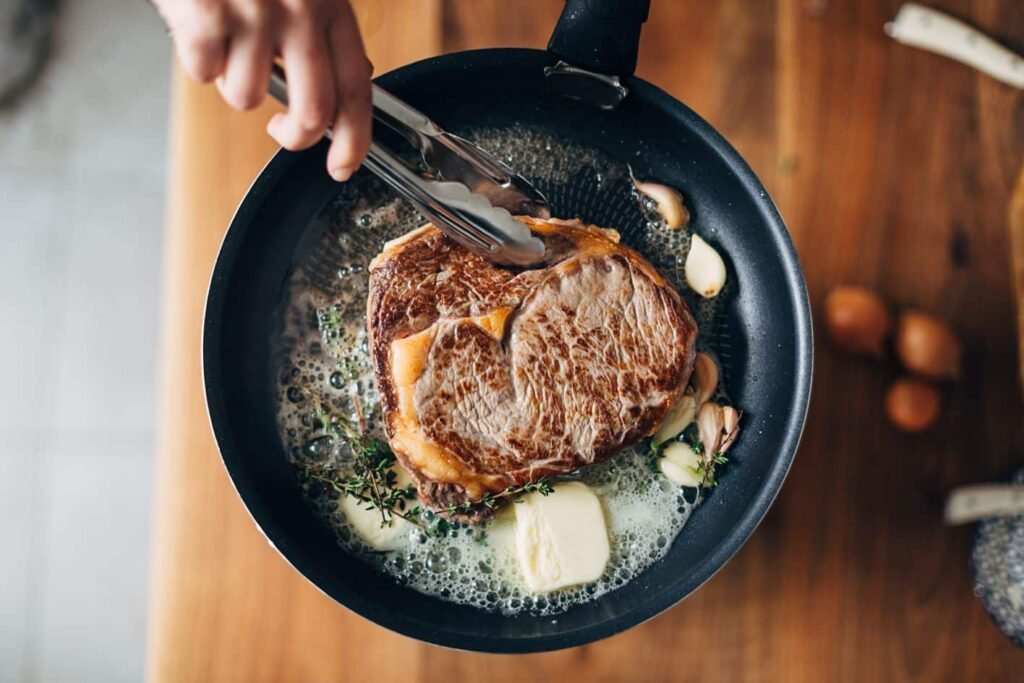Table of Contents
ToggleThe no-carb diet has become a hot topic in the health and wellness community, especially among those seeking quick and noticeable weight loss. But what does the really involve, and how does it differ from other popular diets? If you’re curious about this trending approach, let’s break it down.
The Basics:
At its core, the no-carb diet is all about completely eliminating carbohydrates from your diet. This isn’t just about skipping bread or pasta; it means cutting out almost all plant-based foods, including fruits, vegetables, and legumes. The goal is to minimize carbohydrate intake to near zero, focusing instead on foods that are high in protein and fat.
Followers of this way of eating typically consume meals rich in animal products like meat, eggs, and dairy. These foods are naturally low in carbs, making them the staples of this diet. Some people may include small amounts of leafy greens, but the strictest versions of the no-carb diet avoid all plant-based foods, focusing exclusively on animal-derived products.
No-Carb vs. Low-Carb Diets: What’s the Difference?
It’s easy to confuse the no-carb diet with other low-carb diets, but there are important distinctions. Low-carb diets like Atkins or Keto allow for some carbohydrate intake, usually in the range of 20-100 grams of net carbs per day. These diets also emphasize high fat intake, particularly in the case of Keto, which aims to keep the body in a state of ketosis.
The no-carb diet, however, takes carb restriction to the extreme. While low-carb diets still permit a small amount of carbs, the no-carb diet aims to cut them out entirely. This means that even foods like nuts, seeds, and most vegetables, which are allowed in low-carb diets, are off-limits on a strict no-carb diet.
Understanding the Zero-Carb Diet
Is exactly what it sounds like: a dietary approach that restricts carbohydrate intake to the lowest possible levels. While it shares similarities with other carbohydrate-restricted diets like Atkins and Keto, there are key differences that set the zero-carb diet apart.
For instance, the Atkins diet allows its followers to consume between 20 and 100 grams of net carbs per day, depending on the specific phase they are in. The concept of net carbs is crucial here; it refers to the total carbohydrates in a meal minus the fiber content. This means that while Atkins restricts carbs, it still permits certain carbohydrate-rich foods if they also provide fiber.
Similarly, the Keto diet also aims to limit carbohydrate intake, generally capping it at 50 grams or less per day. However, the Keto diet places a strong emphasis on high fat intake, along with a moderate amount of protein.
In contrast, a zero-carb diet strives for the absolute minimum in carbohydrate consumption without offering specific guidelines on the proportion of protein versus fat that should be included in one’s meals. This lack of structure can make the zero-carb diet less defined than its counterparts.
What Can You Eat?
So, what exactly do you eat on a no-carb diet? The menu is primarily composed of animal products:
- Meat: Beef, pork, lamb, and other meats are central to the no-carb diet.
- Seafood: Fish and shellfish are also key components, providing protein and healthy fats.
- Poultry: Chicken, turkey, and other birds are popular choices.
- Eggs: A versatile and staple food.
- Cheese: Many types of cheese are low in carbs and are often included.
- Butter and lard: These fats are used for cooking and adding flavor.
Some followers may include small amounts of non-starchy vegetables like spinach or lettuce, but this is often debated among purists. The strictest interpretations exclude all plant-based foods, adhering strictly to animal products.
The Pros and Cons of a No-Carb Diet
Like any diet, the no-carb diet has its advantages and disadvantages. While it might offer some appealing benefits, it also comes with significant risks that should be carefully considered.
The Potential Benefits
One of the main reasons people are drawn to the no-carb diet is the promise of rapid weight loss. Many who try the no-carb diet report losing weight quickly, especially in the first few weeks. This is often due to the loss of water weight as the body depletes its carbohydrate stores.
Another potential benefit of the no-carbs is improved blood sugar control. By eliminating carbs, the diet may help reduce insulin levels and improve insulin sensitivity, which can be beneficial for people with insulin resistance or type 2 diabetes. However, these benefits are still debated among healthcare professionals.
One of the reasons the no-carb diet can be effective for weight loss is its focus on protein and fat, which are more satiating than carbohydrates. This means you might feel fuller for longer, reducing the likelihood of overeating or snacking between meals.
The Downsides You Need to Know About
Despite the potential benefits, the no-carb diet comes with significant drawbacks. The most obvious concern is the risk of nutrient deficiencies. Plant-based foods are rich in essential vitamins and minerals, such as vitamin C, potassium, and fiber. Without these, those on no-carbs may experience issues like poor digestion, weakened immune function, and even long-term health problems.
Fiber, in particular, is crucial for maintaining a healthy digestive system. It helps regulate bowel movements, supports healthy gut bacteria, and can lower cholesterol levels. The no-carb diet is naturally very low in fiber, which can lead to digestive issues like constipation and an increased risk of colon cancer.
Heart health is another major concern. It´s often high in saturated fats, found in foods like meat and butter. High intake of saturated fats can raise LDL cholesterol levels, increasing the risk of heart disease. While some sources of healthy fats, like omega-3 fatty acids from fish, are included in the no-carb diet, many plant-based sources of heart-healthy fats, like avocados and nuts, are excluded.
Could a No-Carb Diet Harm Your Relationship with Food?
There’s also the psychological aspect to consider. The no-carb diet is extremely restrictive, which can lead to an unhealthy relationship with food. When you cut out an entire food group, you might start to view those foods as “bad” or feel guilty if you eat them. This kind of thinking can foster disordered eating habits, which can be harmful in the long term.
Highly restrictive diets like the no-carb diet have been linked to increased anxiety around food, binge eating, and even the development of eating disorders. These conditions can be serious and are often difficult to treat, so it’s important to approach any restrictive diet with caution.
Is it Right for You?
Given the potential risks and rewards, it’s essential to consider whether the no-carb diet is the right choice for you. Here’s what you should think about before making any decisions.
Who Might Benefit from this Diet?
It might be suitable for individuals looking for a quick way to kickstart weight loss, especially under medical supervision. It could also be beneficial for people with specific health conditions that require strict carbohydrate control, like certain forms of diabetes. However, it’s crucial to approach this diet carefully and with the guidance of a healthcare provider.
Who Should Avoid a No-Carb Diet?
If you enjoy a balanced diet and value variety in your meals, the no-carb diet may not be the best choice. It’s especially important to avoid it if you have a history of disordered eating or a complicated relationship with food. The restrictive nature could exacerbate these issues and lead to further health problems.
Additionally, those with heart concerns or digestive issues should be wary of the no-carb diet due to its high fat content and lack of fiber. The long-term health risks may outweigh the short-term benefits for these individuals.
Alternatives to Consider
If you’re interested in reducing your carb intake but aren’t ready to commit to the extreme restrictions of the no-carb diet, there are other options to consider. Diets like Keto or Paleo provide structure and carb control while still allowing some flexibility. You might also focus on eating whole, unprocessed foods and reducing refined carbs, which can offer many of the benefits of a no-carb diet without the extreme limitations.
Conclusion: Is the No-Carb Diet Worth It?
The no-carb diet is certainly a bold approach to weight loss and health management. While it offers the promise of quick results, it’s important to weigh these against the potential health risks and the sustainability of such a restrictive diet. For most people, a more balanced approach that includes a variety of foods and nutrients is likely the better choice for long-term health and happiness.
Before embarking on any new diet, especially one as restrictive as the no-carb diet, it’s essential to consult with a healthcare provider. The best diet is one that you can maintain, that makes you feel good, and that supports your overall well-being.
Remember, food should nourish your body and soul, and there’s no one-size-fits-all answer when it comes to finding the perfect diet. Make choices that empower you, not restrict you, and focus on what makes you feel your best every day.































